|
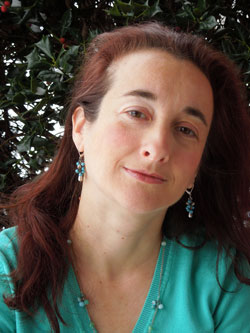
Tell me about yourself. Where did you grow up?
I grew up in an industrial town in communist Romania of the '70s and '80s. My father was a chemical engineer
and my mother taught middle school Romanian and French.
Things got progressively worse in the '80s when the food and basic supplies penuria reached its heights.
Everything was rationed: bread, sugar, cooking oil, gas. The stores were empty and there were huge lines
for everything useful, not only food. We had hot water only on weekends for a couple of hours, and only
two hours of state-controlled TV each day. These things show up sometimes in my poems because they were
part of daily life.
But I had a normal childhood, pretty uneventful. I played the violin. My parents did a good job sheltering
me from everything. And you get used to not having certain things, like bananas, or cartoons.
It's surprising how well humans adapt. In high school, I started to listen to Radio Free Europe,
mostly because of their rock music hour. It was of course illegal, but everyone was doing it.
There wasn't much TV to watch, so I turned to books instead. I was always bookish and shy, so I read a lot.
In the '80s, there weren't many new translations being made because of the censorship, but the classics were
available. So I spent a lot of time reading.
Then, in 1989, the revolution happened, and the whole communist structure went bust. For the first time,
there was freedom, freedom to travel, to do anything. We didn't really know what to do with that much
freedom, except to emigrate.
You immigrated to the USA in 1995. What was this experience like for you? How did you adjust to life here?
At the insistence of a close friend, I applied to the visa lottery. It's a program of the State Department
called "Diversity Visa," through which a certain number of green cards are awarded to immigrants from different
countries. The computer drew my application number. Ironically, my good friend who suggested to emigrate
together didn't get the visa.
I flew directly to New York in June 1995, by myself, because I knew English and I could potentially get a
job. I was 26, and terrified. First time on my own, and in NY, no less (my husband, who didn't know a word
of English, followed shortly, in July.) Getting used to the new life at the New York pace was one of the
hardest things I did. I had no friends, no family, no clue. I knew English, but everyone talked so fast!
I couldn't keep up translating in my head. But I was lucky enough to land a hostess job in a restaurant
two weeks after my arrival. I seated tons of people and smiled a lot. The rest, as they say, it's history.
When did you start writing poetry?
I started by writing prose first, not poetry. I think I was in 6th or 7th grade. I wrote sci-fi novels about
kids my age who had adventures in space. Talk about escapism, heh?
Poetry came a bit later, in high school. I wrote through my first 3 years of college but published
very little. After the regime change in 1989, I went on a long hiatus. Life got in the way.
Everything was changing very fast, and continued to change when I emigrated and started over.
It wasn't until 2002 that I started writing poetry again in Romanian, on and off. I kept a journal.
I switched to English in 2004. I published one or two poems per year, and never thought poetry was
really possible until 2007 when I joined The Red Wheelbarrow Poets. It's because of the group and
our weekly meetings that I can say I'm writing today.
Where is your favorite place to write?
I don't have a favorite place to write. I don't sit in a favorite chair, or gaze out the window, etc. Ok,
some gazing is involved, because I write on the bus on my daily commute between New Jersey and New York.
It's hardly my favorite, but I can credit New Jersey Transit with giving me enough commuting time and a
seat so I can jot down my poems. I revise on the laptop at my dining room table, usually late at night.
Talk about your books: "Angels & Beasts," "The System," "Eternity's Orthography," and the anthology of
contemporary Romanian poetry "The Vanishing Point That Whistles."

I'll start in chronological order. "Eternity's Orthography" is my first chapbook, some of the first poems
I wrote in English. Very delicate and nostalgic poems about the Romanian countryside and its people. It was
published in 2007 by Finishing Line Press.
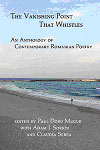
In 2007, I started to work on translations of contemporary Romanian poetry. My own poems were getting rejected
a lot, and some editors asked me to submit translations instead. That's how I started. Romanian poetry is very
strong, beautiful work that always inspires me and gives me courage. It deserves to be known better. I met
Paul Doru Mugur and Adam Sorkin who had a lot of editorial and translation experience, and we worked together
for the next 3 years. "The Vanishing Point That Whistles" was published in 2011 by Talisman House Publishers.
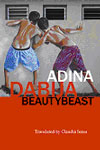
At the same time, I discovered Adina Dabija's poems and translated those as well. We became friends quickly-she
lives in New York. Her style is different from mine, much more playful, irreverent, but serious at the same time.
"Beautybeast" was published in 2012 by North Shore Press, Alaska.
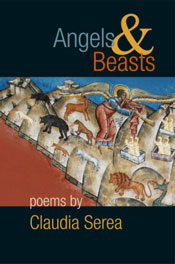
But I continued writing my own poems as well. My style evolved, and, by 2010, I discovered the prose poem as a new,
interesting form. I love the freedom of the prose poem: you can be as crazy as you want-in fact, the crazier,
the better. I started to write short surreal paragraphs inspired by my daughter's nightmares, dreams, old folk
tales and Romanian myths, pieces of news, and fragments of the "only in New York" kind. This is how
"Angels & Beasts" was born, my collection of prose poems published in 2012 by Phoenicia Publishing in
Montreal, Canada.
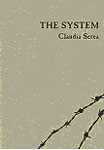
"The System," my latest chapbook, is a different story. I have to give you a few details first: I am the
daughter and granddaughter of former political prisoners in Romania. In 1958, a huge wave of violence swept
the country in the push of the communist regime to complete the nationalization of the land. Everyone who
didn't want to give away their little parcel of land, horse, or tractor to the collective was accused of
"conspiracy against social order," sent to a masquerade trial, then off to prison or forced labor camps.
Tens of thousands of peasants were arrested. Among them, my grandfather and his two sons, my father and
my uncle. My grandfather was sentenced to 25 years of hard prison. My father was 18 at the time of his
arrest. He was sentenced to 8 years. My uncle was arrested earlier in connection with the Hungary
uprising and sentenced to 10 years.
In "The System," I go back to the minimalistic style of my first collection, only the topic is much
more somber. This small book is my attempt to dismantle and look at the individual parts that make a
repression system, and how all the parts work together to crush the victim. I follow my father through
all the steps, from the informant's report to the secret police, to the arrest, interrogation, trial,
sentencing, the prison, the guards, the labor camp, and finally the release from prison into the larger
prison of the country. The chapbook ends with an informant again because my father was followed by the
secret police after his release from prison as well.
Talk about your book just released in December 2013. What is the name of the book?

My latest collection is called "A Dirt Road Hangs From the Sky," published by another Canadian press,
8th House Publishing. This book is the full-length volume building on "The System." The focus here is
not the repression system itself, but the suffering of the victims. It occurred to me that when all
these events happened, my grandmother was in her 40s, just like me now. In one year, she
lost everything: her husband and her sons, whom she didn't know if she'd see them alive
again; she was evicted from her house and all her possessions were confiscated. She was
left without any means of subsistence. I wondered how she must have felt. She must have
cried a lot-but she was a deeply religious woman, and she survived. This book is about
her and about the countless other victims who didn't protest or were silenced. It's a
book about memory, pain, and ultimately about surviving. Here is a short poem from the
beginning of the book:
Words around my neck
Tell me, grandma, everything you know,
so I can be your mouth when you're gone.
I'll be one with you.
Your brown eyes will be mine,
your hair, your nails, your breath,
all mine.
I'll wear your words around my neck
on a silver chain with a filigree heart.
I'll keep the necklace
on the table next to me at night,
next to the stained mirror
that has seen it all.
The chain will give a faint glint
and start speaking
when the moon will muster
enough courage to stand witness.
You also have a book coming out next year by Červená Barva Press. Talk about that book as well.
"To Part Is to Die a Little," forthcoming from Červená Barva Press, is a book about my immigration journey.
These are poems very dear to me about my decision to leave Romania and my first impressions from New York where
I worked in a restaurant; poems about memories, old and new friends, about carving a new life and meeting
people from all over the world. There are poems of longing for home before I knew my home was here. Poems
about the loneliness of the immigrant in New York. For years, I asked myself if my decision was good or not.
I still feel sometimes that I live two lives at the same time, one here and one there.
Who are some of your favorite writers and why? Which writers are so inspirational to you
that you read them over and over?
Oh, I have many favorites, but I'll name just a few. They are writers who just speak to me, there's
no other way to describe it. Writers from which I learn and who make me want to write better. From
the Romanian poets, certainly Mircea Cartarescu, Ioan Es. Pop, Cristian Popescu, among many other
crazy good young poets that I admire. On the American side, my biggest discovery was Charles Simic.
I just love him-and there is nothing better than "The World Never Ends." Also, Anne Sexton, Sylvia Plath,
James Wright, Stanley Kunitz, William Carlos Williams, Peter Balakian. I always go back to them;
I have a stack on my nightstand.
And I can't forget some other international names: Anna Akhmatova, of course, and also
Tomas Tranströmer, Federico Garcia Lorca ("Poet In New York" was a revelation), Rilke,
Neruda (especially "The Book of Questions" and "22 Love Songs.") I have to add some novelists
as well: Mircea Eliade, Gabriel Garcia Marquez, Mario Vargas Llosa, Milan Kundera, Vladimir Nabokov,
Herta Muller. I could go on and on, really, but I'll stop here.
Any last words?
Keep writing, dear friends. Never give up. Persistence is the most important quality.

|

